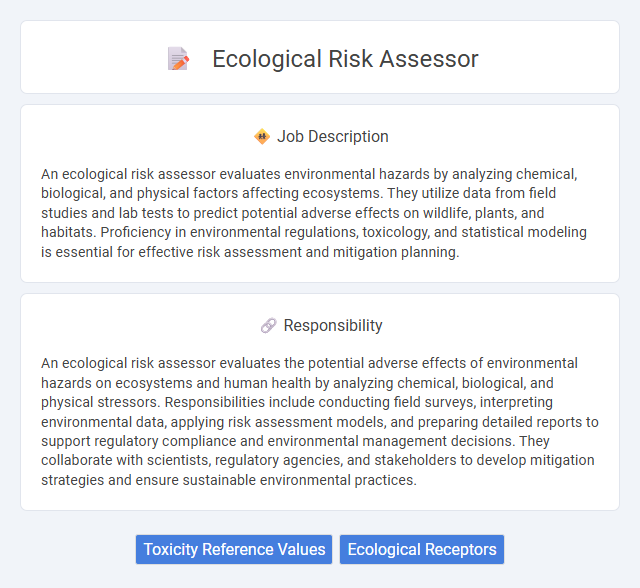
An ecological risk assessor evaluates environmental hazards by analyzing chemical, biological, and physical factors affecting ecosystems. They utilize data from field studies and lab tests to predict potential adverse effects on wildlife, plants, and habitats. Proficiency in environmental regulations, toxicology, and statistical modeling is essential for effective risk assessment and mitigation planning.
People with strong analytical skills and a passion for environmental science are likely suitable for the ecological risk assessor role, as it demands detailed evaluation of environmental data and risk factors. Those comfortable working in variable field conditions and interpreting complex ecological interactions may find this job aligns well with their strengths. Individuals who prefer routine desk work or lack interest in environmental issues might face challenges thriving in this position.
Qualification
Ecological risk assessors typically require a bachelor's or master's degree in environmental science, ecology, toxicology, or related fields to evaluate environmental hazards effectively. Proficiency in data analysis, environmental regulations, and risk assessment methodologies is essential for identifying potential impacts on ecosystems. Strong skills in GIS, statistical software, and scientific report writing enhance an assessor's ability to communicate findings and support environmental decision-making.
Responsibility
An ecological risk assessor evaluates the potential adverse effects of environmental hazards on ecosystems and human health by analyzing chemical, biological, and physical stressors. Responsibilities include conducting field surveys, interpreting environmental data, applying risk assessment models, and preparing detailed reports to support regulatory compliance and environmental management decisions. They collaborate with scientists, regulatory agencies, and stakeholders to develop mitigation strategies and ensure sustainable environmental practices.
Benefit
The role of an ecological risk assessor likely offers the benefit of contributing to environmental protection by evaluating potential hazards to ecosystems and public health. Professionals in this field probably gain valuable expertise in risk analysis, environmental regulations, and sustainable practices. This career path may also provide opportunities for meaningful impact through informing policy decisions and promoting ecological conservation.
Challenge
Ecological risk assessors likely face the challenge of accurately evaluating the potential impacts of various environmental stressors on ecosystems despite limited or uncertain data. They may need to integrate complex scientific information from multiple disciplines, increasing the difficulty of making precise risk predictions. The evolving state of environmental regulations and emerging contaminants probably adds further complexity to their assessments.
Career Advancement
Ecological risk assessors analyze environmental hazards to predict potential impacts on ecosystems and human health, often utilizing advanced modeling techniques and extensive field data. Career advancement opportunities include progressing from entry-level analyst roles to senior risk assessor positions, project management, or specialized consulting in regulatory compliance and environmental policy. Gaining certifications such as Registered Environmental Professional (REP) and expanding expertise in geographic information systems (GIS) and toxicology enhances prospects for leadership roles and higher salary brackets.
Key Terms
Toxicity Reference Values
Ecological risk assessors specialize in evaluating potential harmful effects of chemicals on ecosystems by using Toxicity Reference Values (TRVs) as benchmarks. TRVs, including NOEC (No Observed Effect Concentration) and LC50 (Lethal Concentration 50%), are crucial for determining safe exposure levels for aquatic and terrestrial species. Accurate interpretation of these values allows ecological risk assessors to establish regulatory guidelines and prioritize environmental protection measures.
Ecological Receptors
Ecological risk assessors evaluate the potential adverse effects of contaminants on ecological receptors, including plants, animals, and aquatic species, by analyzing exposure pathways and toxicity data. They apply risk assessment frameworks to predict the likelihood and severity of harm to sensitive habitats and populations, ensuring regulatory compliance and ecological protection. Expertise in ecological receptors is critical to identifying vulnerable species and ecosystems to prioritize conservation and remediation efforts.
 kuljobs.com
kuljobs.com